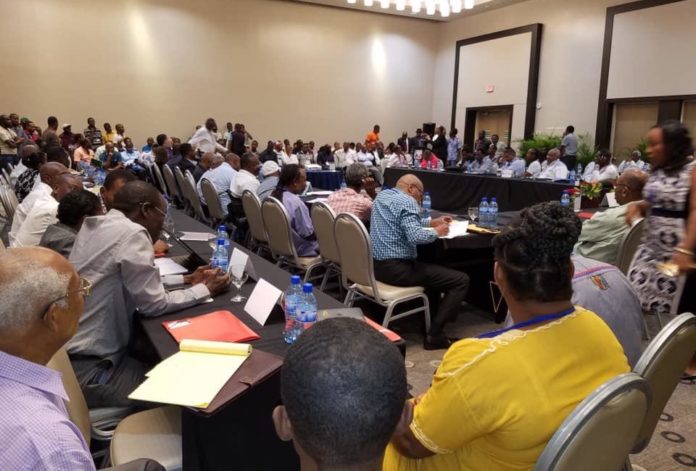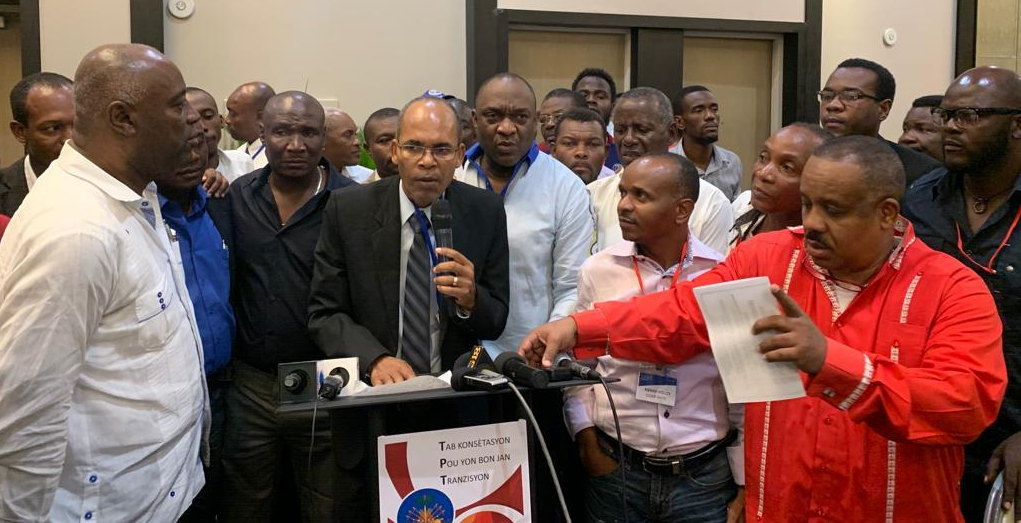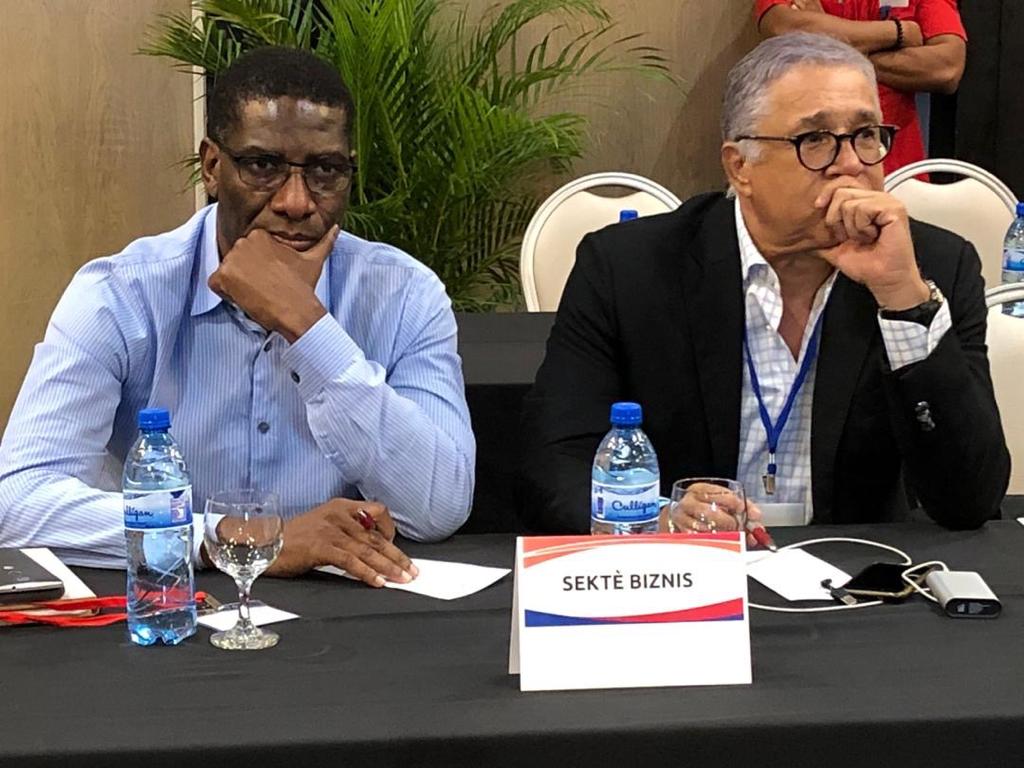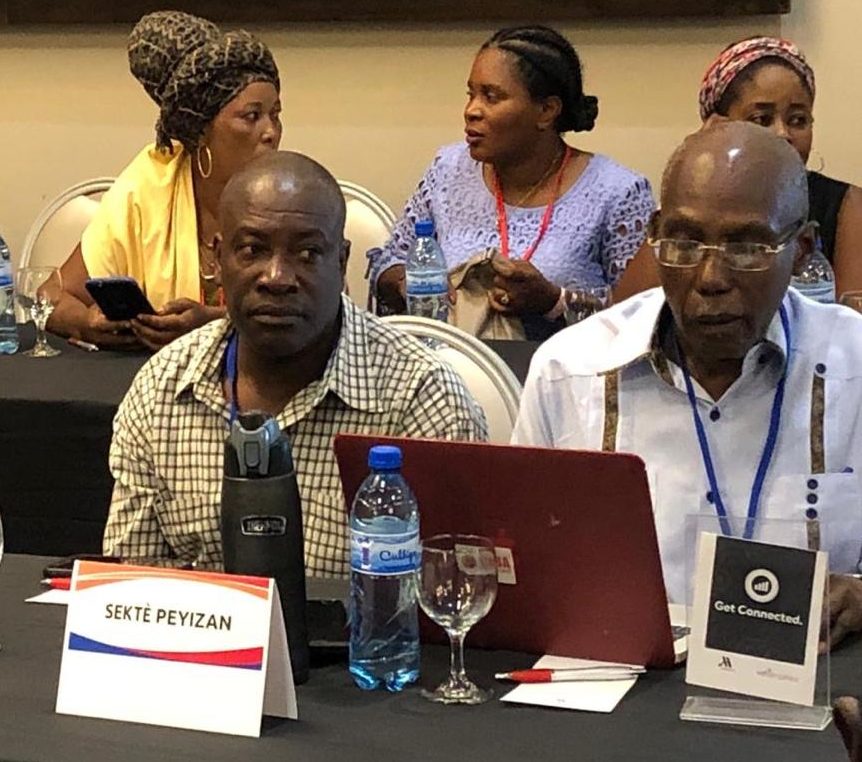
Over the weekend of Nov. 8-10, 2019 at Port-au-Prince’s Marriott Hotel, the five principal opposition coalitions calling for President Jovenel Moïse’s resignation began hammering out an agreement for how the ensuing provisional government would be formed.
But one major political force in Haiti, the Lavalas Family (FL) party of former president Jean-Bertrand Aristide, did not agree with or sign off on the method of choosing an interim president.

The five coalitions – the Consensual Alternative for the Refounding of Haiti, the Gateway for a Transition (Passerelle), the “Mache Kontre,” the Democratic Bloc for National Recovery, and the Patriotic Forum of Papaye – agreed to set up a seven-person commission composed of one representative from each coalition plus two members from “civil society” to choose one judge from the 12 on Haiti’s Supreme Court (Cour de cassation) to be Haiti’s provisional president after Moïse is removed from office.
The FL did not agree with choosing a Supreme Court judge to be interim president and therefore refused to sign the accord establishing the commission.
“Since last year, the Lavalas Family has proposed a ‘Government of Public Salvation’ composed of three people who do not come from any branch of the government – executive, parliamentary, or judicial – because the government is entirely corrupt,” explained a highly placed source within the Lavalas Family organization who asked not to be named. “The masses are demanding for the entire system to be changed, so you cannot take someone from that corrupt system, in this case the corrupt justice branch.”
The people who would be chosen for the “Government of Public Salvation” would be three figures “who the masses know, who have proved themselves, who have not been involved in corruption, who are credible, honest, and trusted by the people,” our source explained. “That’s what the Lavalas Family proposed to take the place of the president.”
“Haiti’s judicial branch is the first institution which could have stopped Jovenel’s crimes because they knew he was a money-launderer and a thief, all the proof was there, but they did nothing,” the source said.
The opposition’s seven-member commission was to have been announced on Tue., Nov. 12, but it was not public as we go to press.
“This commission will review the question of the choice of a president among the judges of the Supreme Court and will define the criteria for choosing the Prime Minister of the transitional government,” said Lemète Zéphyr, the Passerelle’s spokesman, at a podium with the conference’s slogan: “The Table of Concertation for a Good Transition.”
The Marriott meeting’s final accord entitled the Transition Policy Agreement (Entente politique de transition) states: “Considering that it is advisable to find a replacement formula for the President which respects the spirit of the laws, customs, and traditions of the Republic, on the departure of President Jovenel Moïse, he will be replaced by a judge of the Supreme Court and the Parliament will automatically adjourn.”

This was the clause with which the Lavalas Family did not agree.
The full text of the opposition’s agreement had not been made widely available at press time (Tuesday night), but Haïti Liberté managed to obtain a copy.
There are several odd elements in the document.
First, it states that “the Passerelle will assist the work of the Commission as an observer.” This is somewhat strange because the Passerelle is already represented on the yet-to-be specified seven-person commission. Why does only one of the five opposition coalitions have “observers” to “assist” the commission?
Secondly, the Preamble of the document states: “In the face of the national tragedy, a large majority of civil society organizations and political groups call for the resignation of the President of the Republic and the Parliamentarians, who are primarily responsible for the situation. In order to organize their orderly withdrawal, to protect republican institutions today in total decay, to avoid the waste of public resources, and to prevent a generalized disruption (déchoukage), citizens have set up a mission-based mediation structure. highly political and non-partisan: La Passerelle.” Again, the Passerelle seems to have a special standing not just as the “observer” but as also the “mediator.”
Thirdly, the preamble states that the PHTK (Haitian Bald Headed Party) of Jovenel Moïse was also part of the “work sessions” which produced the final document. This seems rather absurd since the PHTK itself has made no mention of taking part in the Marriott conference and has in fact strongly denounced it. It is hard to imagine what role the party’s representatives could possibly play in the “work sessions” formulating the opposition’s strategy and demands.
Finally, the document’s signatories do not include the Passerelle, which apparently organized and paid for the meeting, but it does include the signatures of two controversial senators, Youri Latortue and Saurel Jacinthe, as the “Institutional Opposition” and Jocelyne Colas, the Executive Director of the National Episcopal Commission of Justice and Peace, and René Prévil Joseph, the Secretary General of the Haitian Workers Confederation (CTH), as representing “Civil Society,” both rather vague categories. The senators are already part of the Alternative, and the “civil society” representatives are part of the Passerelle.

The Transition Policy Agreement says that the parties agreed on four points: 1) The mode of governance of the transition, 2) The control structure of governmental action, 3) The road map of the transitional government, and 4) The duration of the transition. But, in fact, only the first point is detailed in the weekend’s accord. For points 2, 3, and 4, the document simply says that “discussions will continue, as quickly as possible, among the signers of the present accord to arrive at a final accord which will include especially the finalization of the roadmap to engage the transitional power, the mechanisms for the choice of government members, and the putting in place of the entity to control the transition’s executive.” Clearly, the fear of the Passerelle “observed” and “mediated” coalition of opposition coalitions is a revolutionary government which is not under their control.
The opposition conference at the Marriott began on the morning of Fri., Nov. 8, and that day all the parties – including the Lavalas Family – signed a “Declaration of Principle” that they were all agreed that President Jovenel Moïse had to leave power.
The conference continued through Saturday, and on Sun., Nov. 10, the opposition coalitions regrouped at the CTH Headquarters on the Route Frères in Pétionville to sign the conference’s final Transition Policy Agreement.
On Nov. 9, the FL’s Executive Committee – composed of Dr. Maryse Narcisse, Joël Edouard “Pasha” Vorbe, Dr. Jean Myrto Julien, and agronomist Anthony Dessources – issued a press release stating that the “Lavalas Family has never recognized and will never recognize the indicted [one] as the country’s president. The differences which exist over how to replace Jovenel will not prevent the Lavalas Family from continuing to take to the streets and mobilize in every way to rid the country of both the indicted one and the blood-sucking corruption system.”

The FL sought to stress that “the agreement we have to send Jovenel away is stronger than the differences we have on how we will replace him.”
Nonetheless, ambiguity surrounds the FL’s official stance, as is often the case. The presence of leading Fanmi Lavalas members such as Dr. Schiller Louidor, lawyer Gervais Charles, and Sen. Nènèl Cassy, among others, in the Consensual Alternative for the Refounding of Haiti, belies the FL Executive Committee’s position.
In March 1990, when the military dictator Gen. Prosper Avril was chased from power, Supreme Court Justice Ertha Pascale Trouillot was named Provisional President, ruling in conjunction with a Council of State.
“The Haitian people had the experience of choosing a Supreme Court judge in 1990, and now they know what kind of terrible thorns (pikan kwana) there can be in that solution,” the highly placed Lavalas source said. “That’s why they say today that we have to completely discard the system, the entire state apparatus, we must get away from that to come with some new solution so that we can continue the battle to totally change the system.”
“The battle the people are waging today has two stages,” the source concluded. “The first is to uproot Jovenel from the Palace, since he symbolizes and is the guard dog of the system. But secondly we have to uproot the retrograde feudal system, which prevents people from living like humans. So the moment has come for a complete change of system.”









